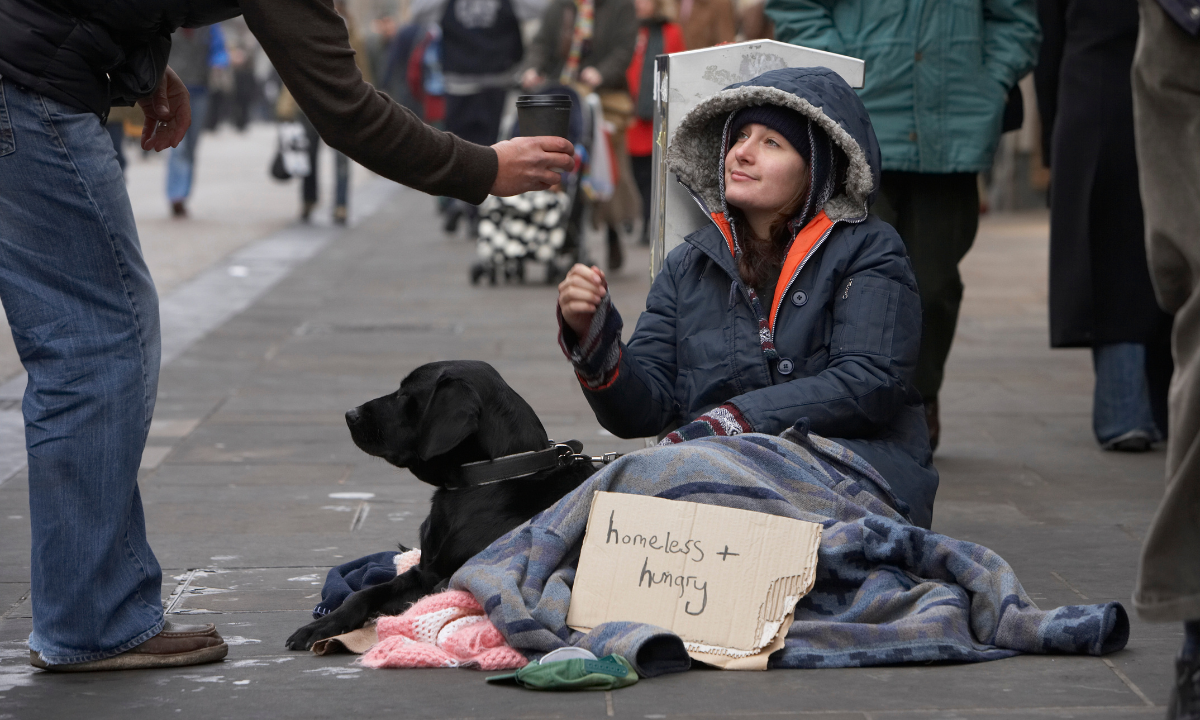How to ensure vulnerable women are housed? Wraparound support is the key
Why It Matters
Collaborations between non-profits and foundations are essential in sustaining and expanding critical services across Canada. These services are often life-changing and directly lead to stronger, more resilient communities.

This story was produced thanks to a partnership between Future of Good and RBC. RBC is proud to support a broad range of community initiatives through donations, community investments and employee volunteer activities. See how at rbc.com/peopleandplanet. See FOG’s editorial ethics and standards here.
Lia Grimanis didn’t set out to build a nationally recognized non-profit; it was born from her lived experience, which is now driving the purpose behind Up With Women.
“There’s a really deep ‘why’ that exists for this organization,” Grimanis said.
“I fled violence and ended up periodically homeless between the ages of 16 and 19.”
Years later, she created Up With Women to help homeless and at-risk women and gender-diverse people build a sustainable pathway out of poverty, the kind of support she wished had been available to her as a teenager.
“Sometimes you end up behind the locked doors of the wrong people, and that certainly happened to me, so by the time I ended up in a shelter, I was really broken down.”
Statistics from the Women’s National Housing and Homeless Network (WNHHN), show women are more likely to experience “hidden homelessness,” exhausting all informal supports and resources before seeking formal services.
Drawing from her own experience of nearly a decade of working to regain stability, Grimanis made a promise to support other women in rebuilding their lives, and to help them do it faster than she was able to herself.
Surviving the start
Launching her non-profit came with significant challenges, including facing personal bankruptcy to keep the charity operational.
“It’s incredibly difficult because donors in Canada tend to act like blue-chip investors. They really want to work with the brands that they know,” she said.
However, she credits RBC Foundation, one of its founding partners, for trusting her mission and stepping in to help sustain the organization.
“RBC Foundation has really been one of the organizations responsible for the survival of Up With Women.”
This kind of support is essential in a sector that has historically lacked adequate resources.
“Gender-specific homelessness programming often sees extreme underfunding,” said Khulud Baig of WNHHN.
The collaboration reflects a long-term commitment, with support that extends well beyond financial contributions.
RBC Foundation also has members who sit on Up With Women’s board, according to Grimanis.
“They’ve been so deeply involved,” she said. “It’s not just about painting walls and stuffing envelopes. There are people at RBC that are MBAs and have expertise in law and accounting and to be able to open the doors to that expertise for our clients is incredible.”
Grimanis’s organization is one of many women-focused organizations backed by RBC Foundation’s commitment to driving more inclusive opportunities for prosperity in our communities.
Relationships leading to housing loss
Across Canada, organizations are addressing the complex challenges of poverty, homelessness, and gender-based violence, with support from funders like RBC Foundation, helping to strengthen their impact.
Most women lose their housing due to a breakdown in their romantic relationship, said Amanda Arella, the national director of public policy and advocacy at YWCA Canada.
In response, the YWCA announced its Housing Heals program, set to launch this fall with support from RBC Foundation.
“The Housing Heals program is really intended to help meet survivors when and where they’re at and to help them transition from emergency shelters into more stable long-term housing,” said Arella.
According to Baig, stable housing is a critical foundation for achieving long-term change.
“People need to have the baseline stability through a permanent housing unit,” said Baig. “And then you can start providing them support and rehabilitating them.”
One in five survivors of domestic violence in temporary shelters end up returning to their abuser, typically due to unaffordable housing or a lack of financial and social support, according to Arella.
“We really see the Housing Heals program and the support that RBC Foundation is providing as an essential intervention in breaking that cycle of violence,” said Arella.
The program also connects survivors with staff who provide comprehensive and tailored support, she said.
“This sort of intervention is really key for creating lasting safety and independence, which ultimately are two things that we believe are so important to advancing gender equity.”
The YWCA is one of the largest providers of shelters and affordable housing to women in Canada.
“The ongoing housing crisis or affordability crisis impacts women and girls and gender-diverse people in a slightly different way. It’s important to be responsive to those realities,” said Arella.
The impact on immigrants
The connection between homelessness and domestic violence can be even harder for new Canadians.
It’s one of the reasons RBC Foundation supports organizations like Sakeenah Canada, those working at the intersection of housing, safety, and culturally responsive support for newcomers.
Many immigrants arrive without a clear understanding of the systems meant to protect them, according to Maryam Hikmat, the grants and foundations manager at Sakeenah Canada.
“Newcomers to Canada, they may not understand the rights they have,” said Hikmat. “They don’t feel safe reaching out to say, the police. They think maybe they’re going to get in trouble,”
Sakeenah provides safe spaces and wraparound services to women and families fleeing violence, homelessness or poverty.
The organization addresses homelessness by tackling the trauma and barriers that often accompany it, especially for immigrant women, to create lasting change.
It provides remote case workers to communities where social services aren’t easily accessible, a food market, mental health therapy, and child and youth programs. It is North America’s first licensed Muslim foster care provider.
“Ninety per cent of our clients, once they leave our homes, they have a continued success rate of not falling back, which is incredible compared to other statistics that show one in five women return to their abusers,” said Hikmat.
With support from RBC Foundation, the organization was able to expand capacity to house and provide vital resources to vulnerable women and children.
“It’s so amazing because Toronto and Brampton have one of our largest homes. We were able to house 10 to 20 women and children at a time. So it’s really, really impactful the help that they’re providing us and the support.”
For Hikmat, the support goes beyond the funding.
“They’re having volunteer opportunities with us, and they’re coming to see the clients and they’re coming to see the situations, and it’s really, really great.
“It really creates that personal connection that you can’t do with a call or a report.”
Learn more about RBC and RBC Foundation’s approach to community investments aimed at building stronger and more inclusive communities.

